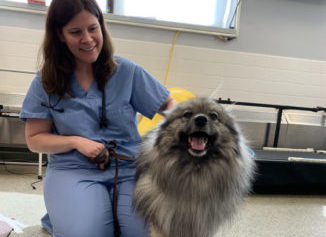Is a clinical trial right for my pet?

Is a clinical trial right for my pet?
While the title of this blog post suggests I will answer this question for you, I can’t answer for your pet. That task belongs to your family. I can outline some questions and their rationale to assist you in decision making.
Many veterinary specialty hospitals like the Animal Medical Center conduct clinical trials. Clinical trials help the veterinary community discover new knowledge about naturally occurring illnesses and, without them, the quality of medical care would stagnate. Clinical trials start with a research protocol. The protocol tests drugs, devices, procedures or other interventions such as a diet change. At AMC, the protocol is approved by a research board called an IACUC (Institutional Animal Care and Use Committee) who ensure the protocol has scientific merit and safeguards for patients. The clinical investigator collects information (blood samples, biopsies, examination information, x-ray images) from the study participants and analyzes the data to determine if the intervention under study is better, the same or not as good than the current standard of care.
Do the goals of the clinical trial meet your goals for treating your pet?
It’s important to keep your pet’s treatment goals in mind when considering a clinical trial for your pet. For example, one of my clients, whose dog has been diagnosed with a slowly growing malignant tumor, sent me a link to a clinical trial for a new drug to treat cancer. The clinical trial she found is a 28-day study evaluating how a new cancer drug is absorbed, metabolized and excreted from the body. While this trial will discover critical information about the new drug, a 28-day chemotherapy treatment is probably not enough to treat this dog’s cancer successfully. She decided against this trial for her dog. Her goal is long term control of her dog’s tumor and this clinical trial is not likely to achieve her goal.
Is a clinical trial free?
Maybe yes, maybe no. Clinical trials may be supported by a drug company, a research grant or the institution sponsoring the study. No matter who funds a clinical trial, there will be a budget and, as part of the informed consent process, you will receive information on the financial incentives included in the study. Be sure to ask what the investigator anticipates your out-of-pocket costs will be. Check with your pet insurance company to see if they will cover out-of-pocket costs of a clinical trial.
What if my pet has side effects during a clinical trial?
The clinical trial protocol will be designed to track and monitor any anticipated side effects. If side effects occur, the protocol will dictate the course of action. Your pet may be able to continue the trial if the side effects are minor or they could be removed from the trial if the effects are serious.
These days, most clinical trials feature a Quality of Life diary completed by the pet’s primary caretaker. This helps you to focus on how your pet is doing and provides the clinical investigator with a valuable resource in recognizing any negative side effects early in the trial.
Before you enter your pet into a clinical trial, ask what the expected side effects are, their frequency and how the study protocol manages side effects. Don’t forget to ask what your financial responsibility is if side effects occur.
How many visits will my pet need to complete the clinical trial protocol?
The answer to this question could be any number. Every study is different. When I’m involved in a clinical trial, I make a handout for the prospective participants outlining the study schedule. Ask if one is available for the trial you are considering.
Does the whole family have to agree to the pet participating in the clinical trial?
Fair question, tough answer. If all family members are going to be involved in taking the pet to clinical trial hospital visits, I say yes. If one family member is the “owner” and expects to give all medications, fill out all the forms and take the pet to all the hospital visits, then it might be their decision alone. If your family is having a difficult time deciding about a clinical trial for your pet, ask the clinical investigator if they collaborate with a social worker who might help in the decision-making process. Another professional to consult is your regular veterinarian. That veterinarian has probably known you and your pet for a long time, understands clinical trials and will be an excellent resource in the decision making process.
Why did the clinical investigator reject my pet from their trial?
All clinical trials have entry criteria. The criteria exist to ensure the data is collected from a group of patients who have a similar disease and with the safety of the participants in mind. Clinical investigators don’t want to make your sick pet sicker and neither do you, so they may feel the study is too risky for your pet.
Clinical trial resources for pet families
AMC clinical trials
American Veterinary Medical Association clinical trials database
Veterinary Cancer Society clinical trials database






























